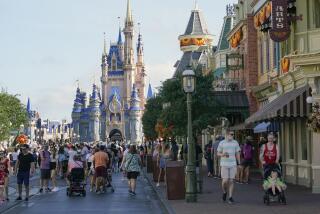Disney Warns Gate Tax Would Scuttle Resort
- Share via
ANAHEIM — Disneyland officials are threatening to kill plans for a $3-billion expansion of the amusement park if an admissions tax is imposed by the city.
“If there was an admissions tax, for all intents and purposes, we would not go ahead with the project,” theme park president Jack Lindquist said in an interview late Tuesday. “We have a great deal of money invested in this (project). Anything that changes that balance would make it impossible.”
City officials have long considered an admissions tax as an untapped revenue source that could help build the parking structures and make street improvements needed for the proposed Disneyland Resort. But Lindquist said that any such tax, which would add to the price of admission, would cancel the project.
Disney has traditionally opposed such a levy, which would tax admissions not only to Disneyland but also to all entertainment venues in the city.
The Disney position takes on even greater significance since the entertainment company has yet to decide whether to locate its second Southern California theme park in Anaheim or in Long Beach where the company has unveiled plans for a ocean-theme resort called Port Disney. The decision on where to locate the new theme park, which company officials have said will depend heavily on which city is the most accommodating, is not expected before the end of the year.
Mayor Fred Hunter, who for months has said the tax might be needed to finance the Disney improvements, characterized Lindquist’s position as a negotiating maneuver and played down the Disney project as not even ranking at the top of the city’s future development plans.
“Having the park (expansion) is not my whole ambition,” Hunter said Wednesday. “We already have Disneyland. Long Beach doesn’t have that. To me, the (sports) arena is more important at this time. We need to get that sucker built.”
A $100-million Anaheim arena is under construction and is scheduled to open in the fall of 1993. Hunter said that project’s completion and the attraction of professional basketball and hockey franchises to fill it should be the city’s top priority.
Hunter, who had expressed unbridled enthusiasm for Disney’s expansion plans, first began discussing the admissions tax as a possible financing mechanism shortly after the project was unveiled in May. At about that time, it was learned that Disney would seek public funds to help in the construction of two multistory parking garages that city officials estimated could cost up to $500 million.
Since that time, talk of an admissions tax grew louder as the city searched for ways to close a $20-million budget deficit, but things quieted down after officials recently chose a combination utility tax and severe budget cuts to close the shortfall. The city’s staff had listed the entertainment tax, along with four other tax options, as possible future revenue sources.
Hunter said it was estimated that a 4% admissions tax would generate an additional $20 million each year for the city.
“I don’t have a closed mind on it,” the mayor said of the admissions tax. “They (Disney) are negotiating. There has to be a financing mechanism to pay for all of this. I’m trying to look out for the best interests of the city of Anaheim. I’m going to look at all the options.”
Councilman Bob D. Simpson characterized the tax as “one of several possible sources of revenue,” adding that there had been no recent discussions regarding the tax.
“It seems early for either side to talk about deal points,” Simpson said, noting that the city has yet to complete its own cost analysis of the project. “I think it’s awfully early to begin rattling sabers.”
Even with the city’s tentative financial position, which has forced some municipal workers out of their jobs, Councilman Irv Pickler said he sees no need for the tax and would be opposed to it as a funding source.
“I’ve been opposed to an admissions tax all along,” Pickler said. “I can’t see any reason for discussing it at all.”
Such a tax would not only raise Disneyland ticket costs but also entry fees to Anaheim Stadium for California Angels and Los Angeles Rams games, movie theaters and other venues where admission fees are charged.
But Lindquist said that with the millions of guests attracted by the park each year, an entertainment tax would hurt Disneyland the most.
“It’s not an admissions tax,” Lindquist said. “Let’s call it what it is. It’s a Disneyland tax. It would also be a burden on the Angels and the Rams.”
Lindquist estimated that Disney’s contribution, if an admissions tax were imposed, would amount to 80% to 85% of the revenue generated for the city.
“We’re the catalyst for tourism, recreation and entertainment,” Lindquist said. “We put our money in it, and it’s used as a device to raise taxes in the city. It’s the old killing the goose that laid the golden egg.”
Lindquist helped lead Disney’s effort to quell a 1975 effort to enact an admissions tax.
The theme park president recalled how opponents of the tax brought busloads of people to fill the City Council chamber. So vehement was the opposition at the time that former Mayor William J. Thom, a leading proponent of the tax, said he changed his vote when forced to face the Disney faithful inside the chamber.
Lindquist said the same pressure could be mustered again, should the tax be formally proposed.
More to Read
Inside the business of entertainment
The Wide Shot brings you news, analysis and insights on everything from streaming wars to production — and what it all means for the future.
You may occasionally receive promotional content from the Los Angeles Times.










